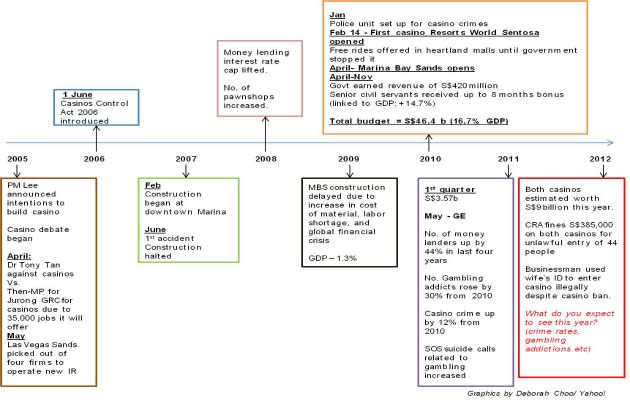Shift casino-focused policies to citizen-centric

COMMENT
The policy to develop two casinos in Singapore, just like the one to allow a massive influx of immigrants, could possibly be held up as another "failed" policy by the ruling government.
When I say failed, I mean this from a citizen-centric point of view. Certainly, the casinos have not let down the 10th Parliament government which passed the law as the casinos have generated a staggering amount of revenue thus far - profits reaped by ensuing parliaments.
Holding its own against the global slumping economy, casino operators Marina Bay Sands and Resorts World Sentosa could certainly have qualified for a reality TV show called 'Asia's Next Top Money Machine', if there were one.
Last year, Marina Bay Sands posted a gross gaming revenue of S$3.72 billion — almost 50 per cent of the total gaming win for the entire Las Vegas Strip over the same twelve-month period which ended on November 30, according to a Wall Street Journal report.
Resorts World Sentosa's gaming revenue amounted to S$2.7 billion last year, about 14 per cent increase from the previous year.
Taxes on the two operators and the levy on local casino patrons have boosted the coffers of government, which announced an estimated S$2.3 billion budget surplus for the fiscal year ending this 31 March.
In January last year, then Second Minister for Finance Lim Hwee Hua told AFP that the Singapore government earned revenues totaling S$420 million for the April to November period of 2010, during the initial months of the casinos' operations.
Two months later, government announced that civil servants would get up to eight months bonus. According to The Straits Times, annual salaries of senior officers in government are "automatically linked" to gross domestic product (GDP) growth, which was 14.5 percent that year.
Not only has government benefitted, but the rise of the casinos has also spawned the proliferation of pawnshops and moneylenders.
The number of moneylenders jumped 44 per cent last year from the number four years before. The interest rates they charge have also surged.
The number of pawnshops has also grown. Last year there were 53 per cent more than there were in 2008.
Government's efforts in controlling casinos
Casinos' efforts to encourage gambling such as the free bus rides from heartland areas in early 2010 prompted the government to step in to curb such promotions after a public uproar.
Subsequently, the Casino Regulatory Authority (CRA) tightened advertising guidelines after casino-related promotions at community getai events and website announcements of winners affected the domestic market.
However, measures to spare the local market from casinos' influence have not been entirely successful. Recently, both casinos were slapped a total fine of S$385,000 for allowing a total of 44 people to gain unlawful entry.
Of the 44, 19 were Singaporeans or permanent residents who sidestepped the entry requirement of paying the entry levy fee, 13 were underage, seven were on exclusion orders, and the last five were gamblers who overstayed the 24 hours the levy entitled them to.
Casinos' impact on Singaporeans
According to CNA, the number of gambling addicts who sought help last year rose by 30 percent from the previous year. More youths between ages 18 to 21 are seeking counselling.
Last year, the number of casino-related crimes rose by 12 per cent to about 520. There is now a dedicated police unit to deal with such crimes.
Between April 2010 to March 2011, nine per cent of the 27,500 calls Samaritans of Singapore (SOS) received were related to difficulties in paying off loans. Comparing to 2009, the number of calls with regard to difficulties involving loan sharks rose by about 61 per cent, while the calls pertaining to gambling problems rose by about 48 percent.
Social services are usually greatly dependent on whether the individual is willing to seek help, or help is sought by their families.
The situation in its entirety seems to reflect a contradiction; while there are social safeguards in place, the proliferation of gambler-friendly businesses may counteract the former intentions.
Perhaps the government should address the root of the problem, by altering its economy-centric policies to a more citizen-centric model.
Certain analysts and members of Parliament would agree that Budget 2012 was generally a people's budget. Maybe the next issue for the government to tackle is how to better shield citizens from the dark side of growth policies.


